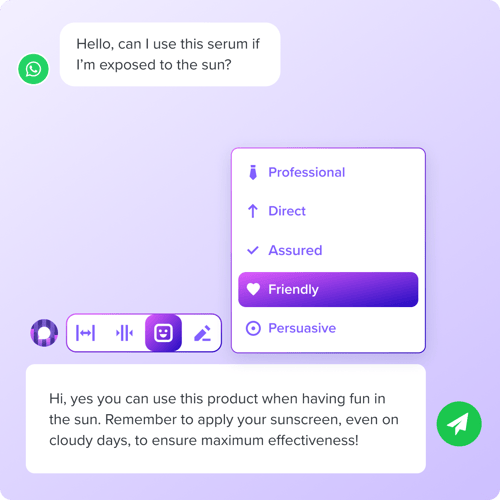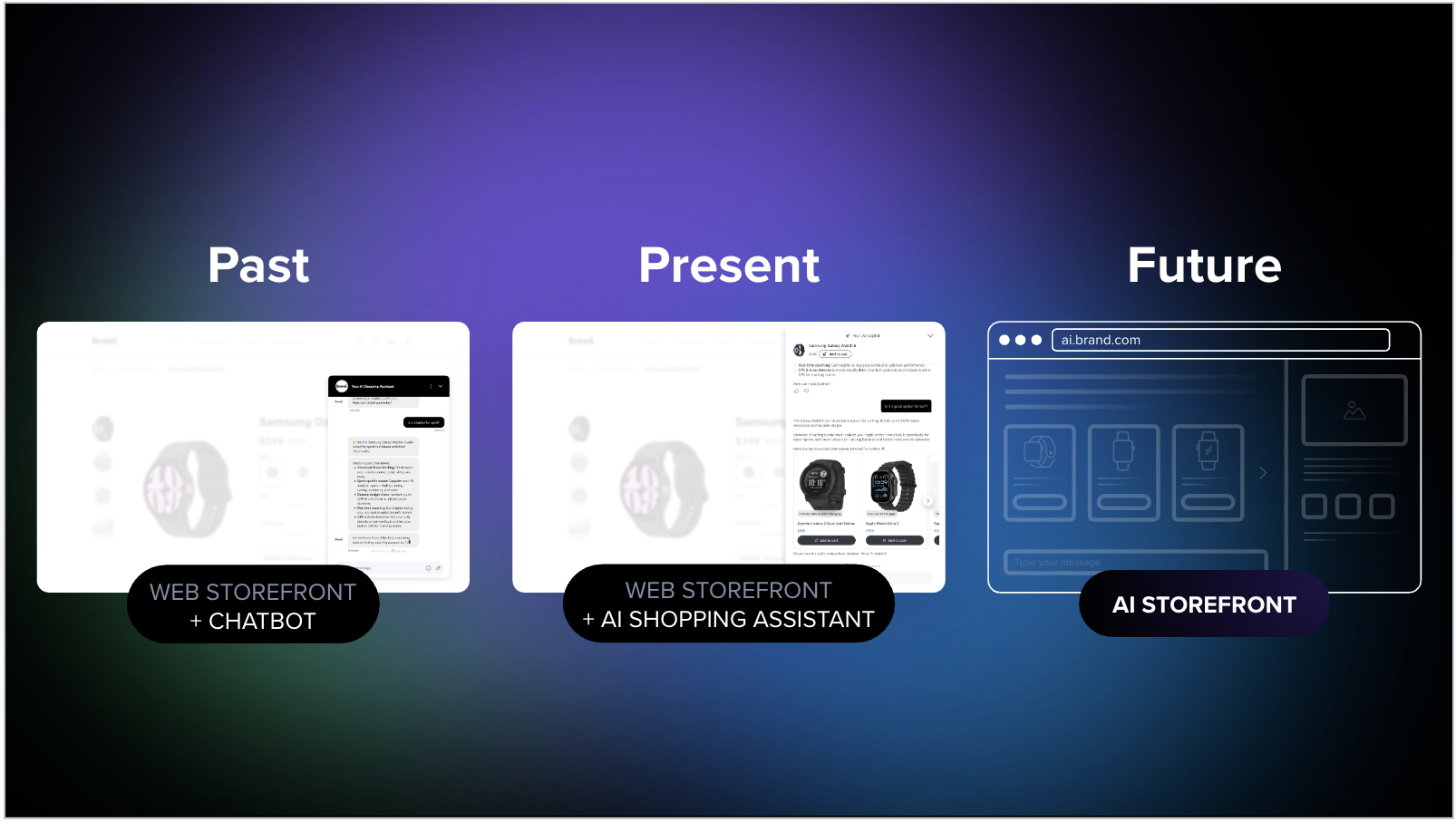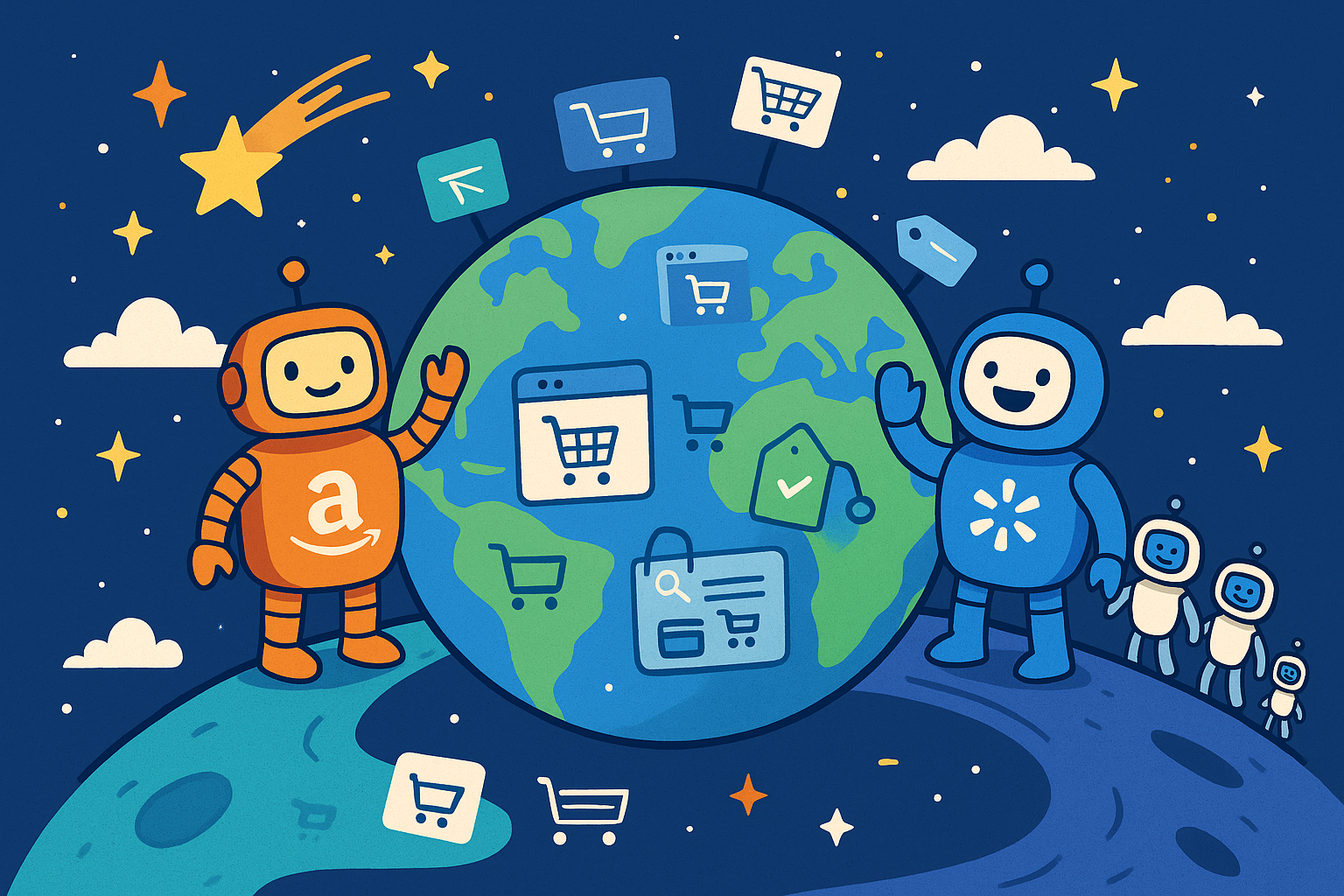4 Trends & Applications of Artificial Intelligence in Ecommerce
Julia Lackey

Last year saw the advancement of generative AI, and the revelation of its immense capabilities, and limitations, to the general public with OpenAI’s chatgpt. The question many are asking now is—what does 2024 have in store? Forrester predicts an impressive adoption by large companies starting this year, specifically for D2C applications. This means that consumers will begin to interact directly with AIs that generate text, sounds, and images through solutions either adopted or created by brands. What are the strategies brands need to develop in order to gain maximum value from this tech, promote customer loyalty, and see results? Discover the most important trends, advantages, and applications for implementing conversational AI on your ecommerce platform this year.
Application #1: Automate Product Information Searches
With its ability to facilitate interactions between customers and brands on a large scale, generative AI is transforming the e-commerce sector. In tandem with human expertise, this software addresses a central challenge of internet sales: providing consumers with immediate, accurate product information to guide their purchasing decisions.
Our recent Ipsos x iAdvize study revealed that 74% of American people are interested in generative AI helping them get detailed information about the products they’re searching for. It also found that 50% of these consumers will abandon their purchase if they can’t easily find it.
The impact of this technology in providing immediacy is anything but trivial. It paves the way for a substantial enhancement in the conversational experience in 2024, benefiting brands and offering relief to consumers alike. The potential and perspectives opened up by these algorithms are truly groundbreaking.
One major area of potential is in boosting customer satisfaction (CSAT). Many brands have already started seeing extremely encouraging scores by equipping themselves with AI-powered chatbots. To name a few, Cdiscount has tripled its customer satisfaction, while Vanden Borre, part of the Fnac-Darty group, has increased it by 28 points.
The enhanced performance is largely due to the quality and speed of responses. Advancements in artificial intelligence enable the implementation of diverse conversational strategies, greatly improving the shopping experience. A prime example is providing detailed product information. Questions like "Can I wear this watch while diving?" or "Is this bike designed to handle all types of terrain?" can now be answered with remarkable personalization, detail, and speed.
AI's ability to deliver highly accurate responses in flawless language effectively removes barriers to purchasing. Watch the video below to see a quick demonstration of what this innovative tool can do.
This tech’s effectiveness at converting site visits into actual purchases is already being demonstrated by brands that have implemented it. Websites have seen a significant increase in their conversion rates, sometimes even reaching up to 24% following a conversation with an AI chatbot, a massive jump from the 3% benchmark ecommerce typically sees.
This improvement is due to the ability of an AI-powered chatbot to respond accurately, quickly, and autonomously to customer inquiries, thus removing some of the obstacles that might prevent them from making a purchase. In short, conversational AI doesn’t just facilitate the buying process, it revolutionizes it by making the online shopping experience seamless for the consumer.
Application #2: Large-Scale Personalized Messaging
In the world of ecommerce, where competition is fierce and customer attention is fleeting (averaging only 8 seconds according to Microsoft), offering a personalized customer experience is the ultimate solution to building positive and lasting connections. Accomplishing this allows brands to achieve a better Customer Lifetime Value (CLV).
Transforming a simple purchase into a memorable and enriching interaction is a challenging task. Traditional personalization has typically required substantial time and human resource investments, both of which are often constraints in the fast-paced world of ecommerce.
In today's digital landscape, the reduced presence of human interaction and the intense competition for customer attention leads some brands to prioritize price over experience, largely due to the costs associated with curating a better user experience.
Take, for example, the $7 million investment by Temu—a new yet formidable competitor to giants like AliExpress or Amazon—for a Super Bowl halftime ad in 2023 promising discounts of up to 90%. Does this mean all brands are shifting away from focusing on the customer experience to relentless promotion?
Not exactly. Many companies understand that a quality customer experience is valuable, a fact established by entities like Forrester in 2016. The real challenge lies in scaling it over digital channels and on your ecommerce website. This is where generative AI becomes pivotal. It makes personalization more cost effective than ever before, breaking down one of the main barriers to implementation.
Generative AI Solves the Challenge of Ecommerce Personalization
This technological advancement enables businesses to offer highly personalized conversations on a much broader scale than ever before.
- Thanks to advanced artificial intelligence, ecommerce conversational processes are no longer limited to preprogrammed, generic responses or decision trees. They can now understand, learn, and respond in the right contextual manner to each customer. This surpasses the limitations of Natural Language Understanding (NLU) chatbots and their natural language processing algorithms. This capability largely relies on advanced data access, allowing AI to quickly adapt to the needs and preferences of users, thus making the shopping experience more tailored and authentic.
- The ability to effectively adapt to each individual interaction in real time is a significant breakthrough for AI, which is what has enabled it to advance at such a rapid rate. An AI software can have your customer service operating at this level 24/7, outside of traditional business hours and when human support isn’t available.
Innovative Technology Suited for Quality Online Customer Interactions
Generative AI uses algorithms beyond NLU that allow it to self-learn and continuously improve based on the brand-specific data you feed it, like product catalogs, knowledge bases, or FAQs. It’s capable of understanding not only natural language but also the nuances, context, and individual preferences that have traditionally limited its capabilities compared to human support.
Conversational AI essentially infuses the humanity your ecommerce platform might be lacking into your user experience.
Moreover, this technology is extremely flexible. It can produce responses in any language, dialect, or industry-specific terminology you choose, making it applicable to virtually all sectors of business. This adaptability allows brands to deploy customized solutions that meet the specific needs of their clientele and align with their unique brand elements, thereby strengthening customer engagement and loyalty.
Because this tool will be vital in 2024, over 50 ecommerce brands have already deployed our business-specific generative A bot, iAdvize Copilot™, on their websites. See what the customer experience can look like with this chatbot:
We’ve developed a use case for conversational AI that will recommend brand products that match a site visitor’s search criteria in an online chat scenario; A process that, until recently, businesses would never have entrusted to a chatbot.
Application #3: Creating an Immediate Customer Experience
Generative AI has the capacity to make the customer experience practically immediate, a feature that will be a major differentiator in 2024.
One of this technology’s key functionalities is that it eliminates any delays that human-led messaging interactions might have. A 2023 customer service study found that the average response time for a customer request is over 12 hours. Another showed that 52% of consumers expect to receive an answer to their inquiry within an hour of posting it on a brand's digital channels.
Generative artificial intelligence enables smooth, uninterrupted communication without frustration—essential in a world where speed of response has become a key factor in determining customer satisfaction.
On an ecommerce platform, visitors frequently ask similar questions, typically about topics like payment or delivery terms. Although these are straightforward for customer service to address, the sheer volume of such inquiries can prove challenging to handle without extra help.
AI’s ability to ingest data and generate outputs that are coherent and highly beneficial for an online shopper allows it to act as a virtual assistant.
On the flipside, with generative AI’s increasing usefulness to businesses, some have raised the question: if AI can perform as well as, if not better than, human customer service representatives, will people be replaced?
AI automation can absolutely scale personalization, but it can’t (and shouldn’t) fully replace the human touch. Instead, agents will begin to use a wider variety of AI tools meant to augment their work.
Application #4: Augmented Customer Service Agents
A gap is starting to form between brands that have equipped their organizations with generative AI assistants and those that haven’t. All brands will eventually follow suit, but the quickest to adopt will gain a significant competitive advantage. Even before the gen-AI revolution, Accenture estimated that successful AI applications could increase a company's profitability by an average of 38% by 2035. Not to mention, it will offer solutions to their teams’ daily challenges.
Integrating AI into customer service agents’ workflow will provide extra resources and information to greatly enhance their ability to interact with consumers and complete tasks. Far from replacing the human element altogether, this type of AI tool acts as a partner, augmenting agents’ skills and enabling them to offer more efficient, empathetic, and personalized service, with less burnout.
Therefore, it’s critical for companies to offer AI training program initiatives that ensure agents are fully equipped to make the most of each tool businesses provide them.
In this set up, AI is instantly analyzing all customer interactions to offer agents context clues and response recommendations. These real-time virtual assistants help speed up response time while maintaining accuracy, thus reducing problem resolution time and boosting customer satisfaction.
For instance, an agent might receive suggestions from the AI in their platform interface on the most relevant products to recommend to a customer, based on that person’s purchase history and preferences. Alternatively, it could give advice on the most appropriate tone and style of communication in answering a customer’s question.

The augmented agent is also a significant asset for handling complex situations. With the addition of artificial intelligence support, agents can tackle more nuanced and technical problems with deeper understanding, relying on data and analysis provided by the software. This not only improves the customer experience by offering more tailored solutions, but also enhances the confidence and satisfaction of the agents themselves.
This synergy between human and machine creates a dynamic in which both parties complement each other—AI brings speed, accuracy, and data analysis, while human support brings empathy, creativity, and judgment. Together, they form a powerful team that’s capable of transforming customers’ interactions into an exceptional experience every time.
What's needed now is a conversational artificial intelligence platform to orchestrate this collaboration, creating the harmonious melody of a top-tier customer experience. Welcome to the era of conversational commerce!

.png)
.png)






